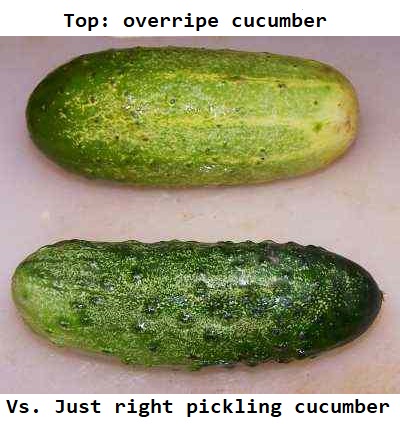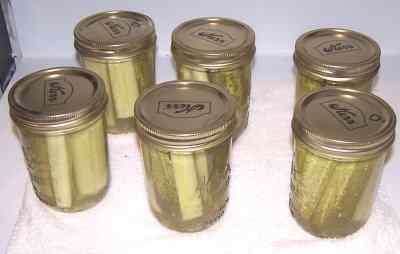
Cucumber U-Pick Orchards in Western Wisconsin in 2025, by county
Below are the U-Pick orchards and farms for cucumbers that we know of in this area.
Not all areas of a state have cucumbers farms that are open to the public. If you know of any others, please tell us using the add a farm form!
Remember to always check with the farm's own website or Facebook page before you go - or call or email them if they don't have a website or Facebook page. Conditions at the farms and crops can change literally overnight, so if you want to avoid a wasted trip out there - check with the farm directly before you go! If I cannot reach them, I DON'T GO!
PLEASE report closed farms, broken links and incorrect info using the "Report Corrections" form below.
New! As inflation remains high, see this page for
reliable (tested) brands of generic canning lids at lower
costs, and cost-saving measures for
getting fruit and vegetables and home canning.
If you are having a hard time
finding canning lids, I've used these, and they're a great price & ship in 2 days.
New! Road tripping and camping is a great way to have a fun, safe and inexpensive family trip. The national and state parks and monuments are open, and campgrounds usually cost between $10 and $40 per night. September to November is the best camping weather. See our new website Road Tripping and Camping.com for tips, tricks, guides, checklists and info about parks, monuments and other places to visit.
New! We just went live with our latest website, FunFactoryTours.com - As they name implies, you can find a fun factory tour, including chocolate, automobiles, historical forts and sites, famous buildings, Active Federal facilities even fun geology: like fossils and volcanic areas
Polk County
- Buttermilk Falls CSA & Folk School Retreat - Uses natural growing practices, beets, broccoli, carrots, cucumbers, eggplants, herbs or spices, peas, peppers, winter squash, tomatoes, other vegetables, Honey from hives on the farm, Maple Syrup from trees on the farm, Fresh eggs, restrooms, picnic area, farm animals, birthday parties, weddings and wedding parties, group reservations
599 280th Street, Osceola, WI 54020. Phone: 612-567-7551. Email: csa@buttermilkcsa.com. Open: Monday to Friday from 7am to 5:30pm; 7 days a week, most days of the year. Directions: From the Twin Cities: Take 35W or 35E North past the merge to 97. Turn right at 97 heading east \\(with a short zig zag on 61\\) and continue until it ends at MN95. Turn left \\(North\\) on 95 to 243. Turn right on 243 \\(East\\) over bridge to Osceola. In Osceola, turn right \\(South\\) until Ridge Road on the right. Take a right at Ridge Road and continue until it T\\\'s at the horse farm. Turn right and look for sign for Philadelphia - truncated. Click here for a map and directions. Payment: Cash, Check, Visa, MasterCard, Discover, AmEx.
Buttermilk Falls CSA & Folk School Retreat Facebook page. Turn right at 97 heading east (with a short zig zag on 61) and continue until it ends at MN95. Turn left (North) on 95 to 243. Turn right on 243 (East) over bridge to Osceola. In Osceola, turn right (South) until Ridge Road on the right. Take a right at Ridge Road and continue until it T's at the horse farm. Turn right and look for sign for Philadelphia Community Farm on the outside of the first curve. That's our driveway. . We use natural practices, but are not yet certified Organic. . We are a community farm and folk school retreat center. In addition to delicious chemical free CSA shares from June-October, we also offer seasonal farm memberships year-round that allow you to come and share/enjoy the resources this farm has to offer, including some pick-your-own opportunities! Visit our website to find out more about our CSA, farm memberships, folk school classes or retreat opportunities. (ADDED: February 25, 2015) (UPDATED: June 24, 2025, JBS)
[ Click here to update the listing ] - Glenna Farms - corn (sweet), cucumbers, pumpkins, winter squash, tomatoes, Maple Syrup from trees on the farm, and prepicked produce, gift shop, snacks and refreshment stand, restrooms, picnic area, birthday parties, weddings and wedding parties, school tours, events at your location (call for info)
1333 - 120th Street, Amery, WI 54001. Phone: 800-310-5050. Email: info@glennafarms.com. Open: Monday to Saturday: 10 am to 5 pm Sunday: 11 am to 4 pm Maple Syrup: March to April Cucumbers: July to August Sweet Corn: July to August Tomatoes: August to September Pumpkins: September to October Squash: September to October Payment: Cash, Visa, MasterCard, Discover, AmEx. Directions: Located between St. Croix Falls, WI and Turtle Lake, WI, 14 mile north of US Hwy 8 on 120th Street. Look for signs! . Click here for a map and directions. Payment: Cash, Visa, MasterCard, Discover, AmEx. (UPDATED: June 24, 2025, JBS)
[ Click here to update the listing ]
Cucumber
Cucumber Picking Tips, Recipes and Information

When it comes to selecting cucumbers at a farm, there are a few key tips to keep in mind to ensure you choose the best ones. Here are two to three
paragraphs of guidance to help you make the right selection:
1. Look for firmness and texture: The first thing you should check is the firmness and texture of the cucumber. Gently squeeze the cucumber to
determine its firmness. A good cucumber should feel firm but not rock-hard. Avoid cucumbers that are overly soft or mushy, as these are signs of
deterioration. Additionally, examine the skin texture. It should be smooth and shiny, without any wrinkles or blemishes. A uniformly colored skin is
also an indicator of a fresh cucumber .The top cucumber in the photo is an overripe pickling cucumber. The bottom cucumber is perfect!
2. Smaller size is better: Cucumbers come in various sizes and shapes, so it ultimately depends on your personal preference. However, there are a
few general guidelines to follow.
Choose slicing cucumbers that are about 6 to 8 inches long, as they tend to have a better flavor and texture.
Burpless cucumbers may be much longer . Pickling cucumbers should be smaller, like 4 to 5 inches.
Avoid
extremely large cucumbers, as they can be tough and have large seeds. In terms of shape, look for cucumbers that are straight and cylindrical. Avoid
ones that are excessively curved or have bulges, as they may have developed irregularities during growth.
3. Look for dark color and freshness: The color of the cucumber can provide valuable information about its freshness. Ideally, cucumbers should have a
vibrant green color, indicating that they are ripe and freshly harvested. Avoid cucumbers that have a dull or yellowish color, (like the top cucumber
in the photo) as this could be a sign
of overripeness or age. Additionally, check the stem end of the cucumber. It should be fresh-looking and not shriveled or dried out. A fresh cucumber
will have a crisp snap when broken, while a stale one may feel limp or bend without resistance.
Cucumber Varieties
There are many types of cucumbers so it is important to select the right type for your purpose.
1. Pickling Cucumbers: Pickling cucumbers are specifically cultivated for making pickles. They are smaller in size, have a firm texture, and a
slightly bumpy or knobby skin. Pickling cucumbers often have a more concentrated flavor, making them ideal for preserving in brine or vinegar.
Gherkins are simply very small (1.5 to 2.5 inch long immature pickling cucumbers.
2. Slicing Cucumbers: Slicing cucumbers are the most common type of cucumber found in grocery stores. They are typically larger than pickling
cucumbers and have a smooth, dark green skin. Slicing cucumbers are great for fresh eating and are often used in salads, sandwiches, or as a
refreshing snack.
3.Burpless, English or European Cucumbers: English cucumbers are longer and thinner than slicing cucumbers. They have a mild, crisp taste and a thin,
tender skin that does not require peeling. These cucumbers are often referred to as "burpless" due to their reputation for being less likely to cause
indigestion or gas.
4. Persian Cucumbers: Persian cucumbers are similar to English cucumbers but slightly shorter and thicker. They have a sweet and crunchy flesh,
and their skin is thin and edible. Persian cucumbers are popular in Mediterranean and Middle Eastern cuisine and are great for salads or as a healthy
snack.
5. Lemon Cucumbers: Lemon cucumbers are small, round cucumbers that resemble lemons in shape and color. They have a mild, slightly sweet flavor
and a thin, tender skin. Lemon cucumbers are often eaten fresh, added to salads, or pickled.
6. Armenian Cucumbers: Armenian cucumbers, also known as snake cucumbers or yard-long cucumbers, are long and slender with a twisted or curved
shape. They have a thin, pale green skin and a crisp texture. Armenian cucumbers are often used in salads, sandwiches, or pickled.
7. Kirby Cucumbers: Kirby cucumbers are small, bumpy cucumbers that are popular for pickling due to their firmness and crunchy texture. They
have a slightly bitter taste and are known for their ability to retain their shape and crunchiness during the pickling process.
These are just a few examples of cucumber types and varieties. Each has its own unique characteristics, so you can choose the one that best suits your
culinary needs and preferences.
Pickling Cucumbers (in water bath canners )
Cucumbers are not acidic so they ONLY way you may safely can them is as pickles:
- Bread and butter cucumber pickles - W, P
- Cucumber pickles (kosher dill, bread & butter, or processed etc.) using mixes - W, P
- Dill pickles, from scratch - W, P
- Old-fashioned fermented general store barrel dill pickles - W, P - (more photos coming)
- Cucumber pickle relish! - W, P - This is the classic hamburger relish!
- No-canning-needed refrigerator cucumber pickles (kosher dill) - W, P
- Low salt / reduced salt low calorie dill pickles.
- Low-salt bread and butter pickles
- Sweet Pickled Gherkins - W, P
- Sweet Pickles (quick recipe) - W, P
- Zucchini pickles (bread-and-bu
Other Local Farm Products (Honey, Horses, Milk, Meat, Eggs, Etc.)
(NOT pick-your-own, unless they are also listed above)
- Farm markets and roadside stands
- Local Honey Finder
- Local Meat, Milk and Eggs
- Venues: Farms, Wineries, Orchards for your event, wedding or party
- Easter egg hunts
- Children"s consignment sales
- Fruit and vegetable festivals
- Winery tours and wine tastings
- Horse rides, stables, lessons, trails
- Maple Syrup farms and sugarworks
- Bed & Breakfasts on Farms, Wineries, Ranches and Orchards
- Pumpkin patches
- Corn mazes
- Zombie Paintball venues
- Christmas Tree Farms & lots
- Environmental resources
- Consumer fraud information
- Wholesale food sources
- Resources for Farmers
Looking for canning equipment and supplies?
Water bath canner with a jar rack
Pressure canners for gas, electric and induction stoves: Presto 23Qt or T-fal 22Qt
Canning scoop (this one is PERFECT)
Ball Blue book (most recent version)
Jars: 8oz canning jars for jams
Find Other types of farms:
Farm markets and roadside stands
Road trips and camping resources
Local Honey, apiaries, beekeepers
Consumer fraud and scams information
Home canning supplies at the best prices on the internet!
Maple Syrup Farms, sugarworks, maple syrup festivals
Environmental information and resources
Farms For Your Event for birthday parties, weddings, receptions, business meetings, retreats, etc.
Festivals - local fruit and vegetable festivals
Get the
most recent version of
the Ball Blue Book
With this Presto 23 quart pressure canner and pressure cooker, you can "can" everything, fruits, vegetables, jams, jellies, salsa, applesauce, pickles, even meats, soups, stews. Model 01781

You can make jams, jellies, can fruit, applesauce, salsa and pickles with water bath canners, like this Granite Ware 12-Piece Canner Kit, Jar Rack, Blancher, Colander and 5 piece Canning Tool Set

